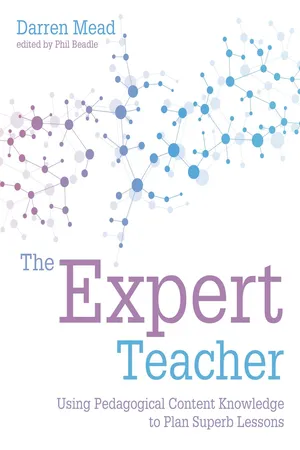
Expert Teacher
Using pedagogical content knowledge to plan superb lessons
- 336 pages
- English
- ePUB (mobile friendly)
- Available on iOS & Android
About this book
'But what does this look like in the classroom?'
This question generally occurs to educators when they enquire into evidence-based approaches to teaching - and often they will get to the end of a teaching manual only to find that it remains unanswered.
In The Expert Teacher, however, Darren Mead provides many of the answers.
One of the most universally respected teachers in Britain, Darren has devoted his professional life to attaining pedagogical excellence. In this book he examines in depth what expert teachers do to help students progress their learning and strive for academic success.
He lays bare the concept of pedagogical content knowledge and eloquently explains how to utilise it to overcome student misconceptions, create contexts and connections in learning and teach difficult and important content - empowering educators to transform their sub-ject knowledge into multiple means of representing it in teachable ways.
The intention of The Expert Teacher is to help teachers to reflect on what and how they plan, how they teach and how to improvise around these plans, and to pave the way for deep professional thinking about best practice. It is split into two parts - entitled How is Your Subject Learned? and Expert Teaching and Learning - and provides educators with a variety of practical tools, illuminating examples and flexible frameworks geared to help them underpin and reinforce the very ampersand in expert teaching & learning.
A warning though: this book is not for teachers seeking quick fixes or superficial tricks. The Expert Teacher is for educators who are eager to experience the excitement of knowing and teaching their subject masterfully.
Suitable for all teachers in all settings.
Tools to learn more effectively

Saving Books

Keyword Search

Annotating Text

Listen to it instead
Information
Pedagogical Content Knowledge: How is Your Subject Learned?
Using Pedagogical Content Knowledge to Plan to Overcome Misconceptions
The ampersand
- Knowing how to represent knowledge so that it can be learned. This is context dependent, with teachers’ prior understanding of their class(es) being a key part of how they go about representing this knowledge.
- Knowing how to organise or sequence knowledge so that it can be learned. We have to understand how the knowledge is connected to other knowledge and other concepts. This must involve planning on a macro and micro scale so that the overarching idea and the interrelated details underneath become clearly connected.
- Knowing which concepts and ideas are difficult to learn and, subsequently, how to help students learn them. This includes knowledge of likely student misconceptions.
- Knowing which knowledge is important. This includes threshold concepts.
Planning to tackle misconceptions
What are misconceptions?
The problem with misconceptions
Table of contents
- Cover
- Praise
- Title Page
- Dedication
- Contents
- Foreword
- Acknowledgements
- Introduction
- Part I: Pedagogical Content Knowledge: How is Your Subject Learned?
- Part II: Pedagogical Content Knowledge: Expert Teaching and Learning
- Conclusion
- References and Further Reading
- Index
- Copyright
Frequently asked questions
- Essential is ideal for learners and professionals who enjoy exploring a wide range of subjects. Access the Essential Library with 800,000+ trusted titles and best-sellers across business, personal growth, and the humanities. Includes unlimited reading time and Standard Read Aloud voice.
- Complete: Perfect for advanced learners and researchers needing full, unrestricted access. Unlock 1.4M+ books across hundreds of subjects, including academic and specialized titles. The Complete Plan also includes advanced features like Premium Read Aloud and Research Assistant.
Please note we cannot support devices running on iOS 13 and Android 7 or earlier. Learn more about using the app